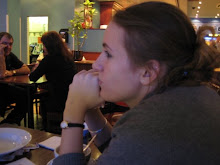I went to a play this past Wednesday, almost a week ago now.
The Oxford Playhouse was running a special offer: a night of free theatre to those under 26, so I took them up on it. I was not overly impressed.
The set was gorgeous. Desks in the center of a library, with shelves reaching up into the recesses of a cavernous, Oxford-like dome.
But from the first line, the acting was off. Not horribly so, but the lines were rushed, mechanic. Spewed at a desperate pace. And I'm still a little unsure why. I mean, I understand why the actors were struggling to connect (when you're trying to jump on a cue without leaving pause for a breath, it's hard to make thought process believable), but I'm not sure why the objective was crazed-pace dialog. I thought perhaps it was a significant aspect of the characters' personalities, but the manic energy wasn't upheld with enough consistency to be believable.
And though the actors warmed up as the night progressed, they never truly recovered from the beginning's recitation. Because the audience failed to see the thoughts behind the lines during those first crucial moments, it was impossible to get a true read on the characters and their objectives. Almost no one is stable in this play, so each mood shift requires more, not less, intentionality from the actors. Otherwise it seems that all we're watching is a loosely sequential series of random actions, dialog, and tragedy.
And while this seems to be a play aiming to frighten with ambiguity -- with the questions it leaves unanswered -- I in no way believe the goal to be leaving the audience uninterested in answers that were never there to begin with.
There were also some issues with blocking, the milder of which I can forgive, but you can't hold a gun within reach of a boy twice your size, recite a monologue, and expect me to believe that he wouldn't have tackled you senseless. He thinks he's going to die, for crying out loud.
Having said all that, there were some fantastic supporting roles, including one chap who looked (and acted) exactly like Jude Law in
Wilde.
